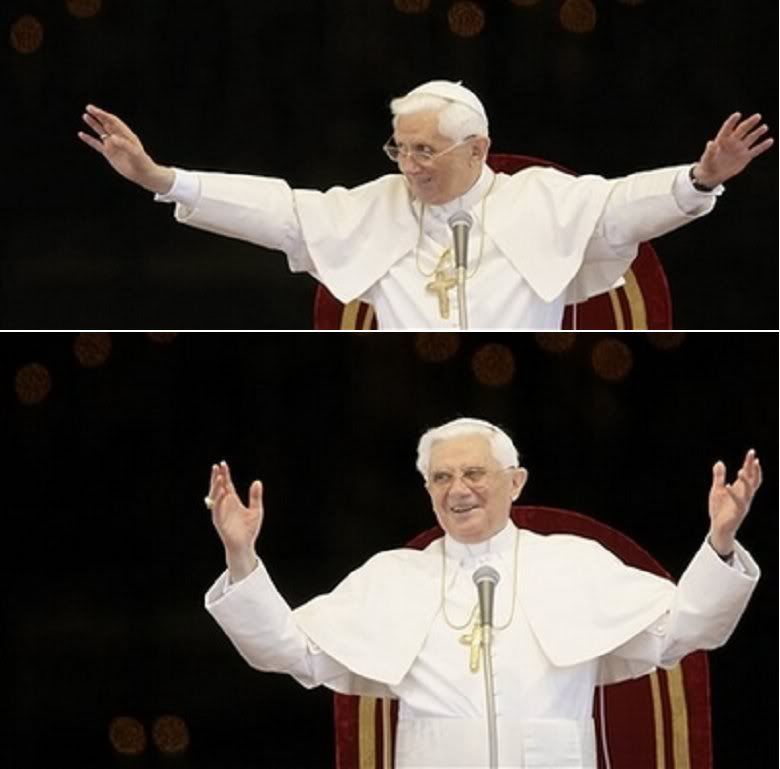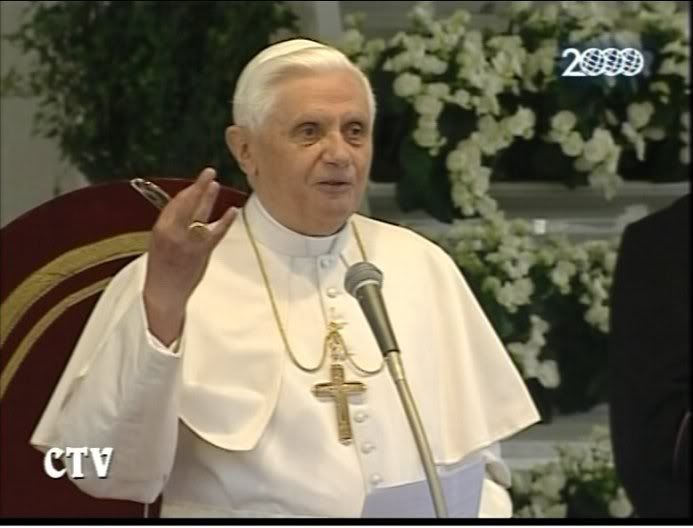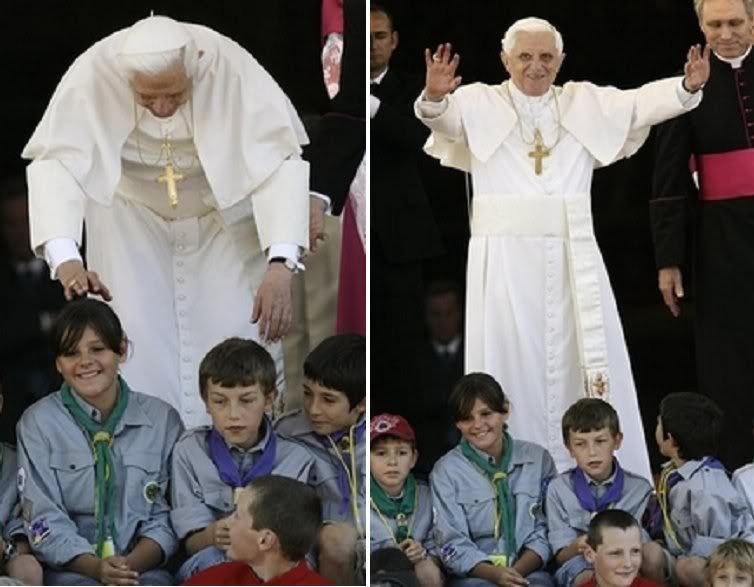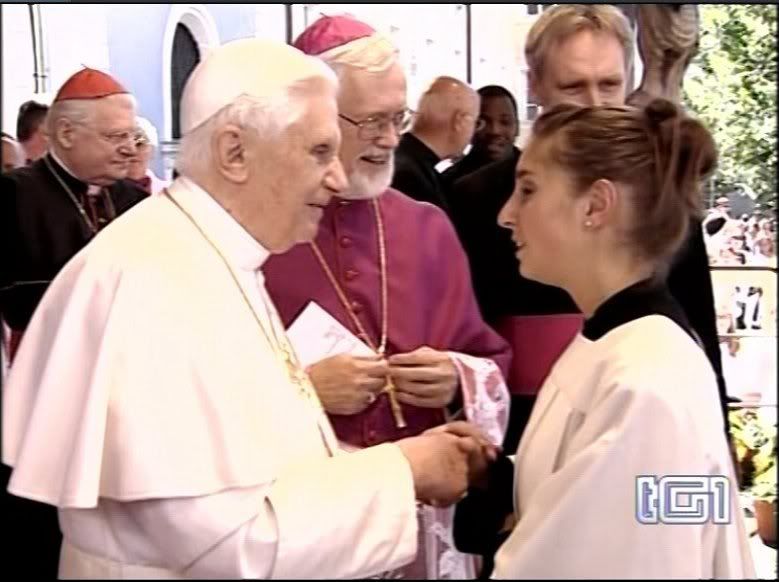 I thought this was a very interesting Angelus. He of course is talking about the Gospel as well as a plea for situation in Georgia. However he talks about WYD and how the young people reacted there. That young people in Vacations do not be to be "in search of false escapes, engage in degrading experiences which not uncommonly end in disturbing tragedies? " The Pope meditations on th Gopsel are often lost in the press reports. However I found his image of the Church he describes significant. Thanks to the Ratzinger Forum for the pics and translation of yesterdays Angelus
I thought this was a very interesting Angelus. He of course is talking about the Gospel as well as a plea for situation in Georgia. However he talks about WYD and how the young people reacted there. That young people in Vacations do not be to be "in search of false escapes, engage in degrading experiences which not uncommonly end in disturbing tragedies? " The Pope meditations on th Gopsel are often lost in the press reports. However I found his image of the Church he describes significant. Thanks to the Ratzinger Forum for the pics and translation of yesterdays Angelus Here is a translation of the Holy Father's words at the noonday Angelus yesterday.
Here is a translation of the Holy Father's words at the noonday Angelus yesterday.
He started in German:
Dear brothers and sisters, St. Mark says in his Gospel that the Lord told his disciples after some stress-filled days, "Come away by yourselves to a deserted place and rest a while" (6,31). Since the words of Christ are never linked only to the moment when they are spoken, I have applied to myself this invitation to his disciples and came to this beautiful peaceful place for some repose.
I must thank Bishop Egger and all his staff, the whole city of Brixen and the region for having prepared for my sake, so that for two weeks I could relax, think of God and of men, and thus regain new strength. Vergelt's Gott! (Thank you.) I should thank each and everyone individually, but I will make it simpler: I ask God's blessing for all. He knows each of us by name and his blessing will touch everyone by name. I ask this with all my heart, and this is my thanks to everyone.
The Gospel on this Sunday takes us from this place of rest back to everyday life. It tells us how the Lord, after the multiplication of the loaves, went up to the mountain in order to be alone with the Father. Meanwhile, the disciples set out on the lake, and with their poor small boat, tried to make headway against a contrary wind.
Perhaps the evangelist already saw that as an image of the Church in his time: how this small boat of the Church was in the crosswind of history, and that the Lord seemed to have forgotten it. We too can see it as an image for the Church in our time, which must fight these crosswinds in many parts of the earth without much success, and the Lord seems very distant.
But the Gospel answers us with comfort and encouragement even as it shows us a way. It tells us, Yes, it is true, the Lord is with the Father, but he is never far away, rather he sees each of us, because whoever is near God is also near others. In fact, the Lord sees them (the disciples), and at the right moment, comes to them.
And as Peter, who was coming towards him, appeared to be in risk of drowning, he takes him by the hand and leads him safely into the boat. The Lord always holds out his hand to us: He does that through the beauty of a Sunday, through the celebration of liturgy. He does it through prayer, through which we come to him. He does it in our meeting with God's Word. In the multiple situations of everyday, he holds out his hand to us. When we take his hand and allow ourselves to be led by him, then we are on the right and good way. And so let us ask him that we may always find his hand. At the same time this means that, in his name, we can hold out our hand to others who are in need and lead them through the waters of our history.
In these days, dear friends, I have been thinking over the experience in Sydney where I met the happy faces of so many young men and women from every part of the world. And I have come to a reflection on that event which I wish to share with you. In the great capital of the young nation of Australia, those young people were a sign of authentic joy, sometimes noisy, but always peaceful and positive.
Although there were so many of them, they did not cause any disorder or damage. In order to be merry, they did not need to resort to coarse and violent means, to alcohol and to drugs. There was simply the joy of meeting each other and to discover a new world together. How can we not compare them to their contemporaries who, in search of false escapes, engage in degrading experiences which not uncommonly end in disturbing tragedies?
This is the typical product of the present so-called 'society of well-being' which, in order to fill up an interior emptiness and the boredom that goes with it, tempts with experiences that are new, more moving, more 'extreme'. Even vacations risk being dissipated into a vain pursuit after mirages of pleasure.
But in this way, the spirit does not rest, the heart does not feel joy, it does not find peace - rather, one ends up feeling more tired and sad than ever. I referred to young people because it is they who have the most thirst for life and new experiences, and therefore, they also run the most risk. But the reflection is valid for all of us: The human being is regenerated only in relationship with God, and one encounters God by learning to listen to his voice in the quiet of our interior being and in silence. (cfr 1 Kings 19,12). Let us pray so that in a society which is always on the go, vacations may be days of genuine relaxation during which we can set aside moments for meditation and prayer, whcih are indispensable for profoundly recovering oneself and others. Let us as ask this through the intercession of the Most Blessed Mary, virgin of silence and of listening.

After the Angelus prayers, he made this statement:
Dear brothers and sisters, Reason for profound anguish is the news, increasingly dramatic, of tragic events happening in Georgia, which have already resulted in many innocent victims in the region of South Ossetia and forced a great number of civilians to leave their homes.
It is my most sincere hope that military actions may cease immediately and - in the name of a common Christian heritage - for all parties involved to abstain from further confrontations and violent retaliations which could degenerate into a more serious conflict; rather, to resolutely follow the path of negotiation with respectful and constructive dialog, thus avoiding further suffering for the dear peoples of the region.
Among other things, I call on the international community and to the countries that can most influence the present situation to do everything to sustain and promote initiatives towards a peaceful lasting solution in favor of open and respectful coexistence.
Together with our Orthodox brothers, let us pray intensely for these intentions, and entrust them with confidence to the intercession of the Most Holy Virgin Mary, Mother of Jesus and of all Christians.
The Pope then delivered his customary greetings in German, Ladino and Italian:
In German -
I think we are all grateful and happy to spend together a Sunday as beautiful as this, which brings me to thinking about Sundays in general. Your bishop has told me that the diocesan program this year includes (promoting) the sanctification of Sunday. And how true! Sunday is indeed important. Not only as a day of relaxation, which we all need - as I said earlier.
But relaxation alone is not all, and Sunday remains empty - indeed, we could come back even more stressed and emmpty than ever - if Sunday does not have the encounter with the Risen Christ at its center. I think that last Sunday and today we all experienced how beautiful it is to when we encounter the Lord in the Eucharist, encountering each other at the sane time. And so I ask you all to welcome this diocesan program on the personal level, so that Sunday may be Sunday, a day of joyful respose and of festive encounter with the good God. I wish you all a blessed Sunday and a good week!
In Ladino -
Dear faithful of the Ladino valleys, St. Joseph Freinademetz brought the Gospel to a distant land. You too should be witnesses and ambassadors of the faith in your families, your towns, and in society. Be witnesses of the faith even to the tourists who come to your valleys.
In Italian -
And finally, my hearfelt greetings to all Italian-speaking pilgrims, particularly the representatives of various parishes in the diocese of Bolzano-Bressanone, as well as the families and young people of other Italian dioceses. As Bishop Egger mentioned, this Cathedral of Bressanone was first consecrated 250 years ago. May every grace come to you from encountering the Lord in this church.
I thank you all for your presence and your affection. I also greet the journalists and other members of the mass media who have followed my vacation. I thank you, dear friends, for your work and your discretion, and I assure you of my prayers for your family and professional intentions. Thank you!
















No comments:
Post a Comment